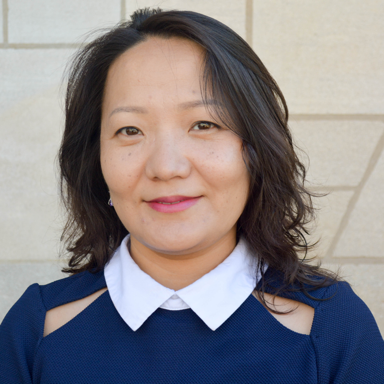Like many students, Ochmaa Escue finds that work and earning a degree can mix. Her life is packed: she has a full-time job, young children at home, and a home remodeling project underway. Escue has been an IU staff member since 2005, and in that time has earned an MS in Information Science and is now working on another degree. The initial degree, with all classes in person, was a bit challenging. “Only so many in-person classes coincided with my free time,” she says.
These days, she is pursuing an MS in Cybersecurity and Risk Management. While this is an in-person program, her classes so far have been online. She fits coursework around everything else in her schedule. “You make a decision to reprioritize your time, your activities, and your to-do list.”
Escue was drawn to the cybersecurity program for its interdisciplinary nature and the opportunity to learn from faculty at the Kelley School of Business; the Luddy School of Informatics, Computing, and Engineering; and the Maurer School of Law.
“My advisor has been my advocate, my liaison,” says Escue. “She helped me navigate registering across three different schools. She guided me in making decisions—what classes to take, how to prepare.”
For six years, Escue has directed the Overseas Studies and Scholarship Program in the Office of the Vice President for Diversity, Equity, and Multicultural Affairs (OVPDEMA) in Bloomington. She loves working with students who travel overseas to study. “I see students who are working abroad have experiences that change their lives.” Increasingly, says Escue, students need to be aware of a country’s data laws. Her growing understanding of cybersecurity risk helps her prepare students to safeguard themselves abroad. “Various countries have different views of global cyber literacy. Cultural barriers prevent people from being fully aware of cyber protections.”
The online advantages
“Online classes are definitely doable, especially for students working full time,” says Escue. Online doesn’t mean remote. Many kinds of communication with professors and teammates make the classes work. There’s even an advantage. “Students who are working full time tend to be more precise and to the point in class discussions, because they want to make the best use of their time.” She adds, “Your return depends on what you put into it, and it’s important to pace yourself.”
Her online classes have been as rigorous and challenging as classes she’s taken on campus. The classes are structured well, and it’s especially helpful when professors set weekly expectations. “It’s clear that many faculty have long taught online and adapt their teaching based on student feedback. Even small changes can make a big impact,” she says. Classes offer plenty of relevant real-life examples. In an upcoming cybersecurity clinic, Escue will work with clients on real cybersecurity incidents. She’s excited to get a taste of the field.
What’s ahead?
Escue plans to continue in her staff role while pursuing her degree. Her supervisor is very supportive, because Escue uses her growing knowledge to make students and her colleagues aware of the pervasive need for cyber awareness.
Escue’s program is opening new doors to future work. Her experience in student affairs and overseas studies, plus her knowledge of cybersecurity risk management, will equip her for an ever-widening set of opportunities.


